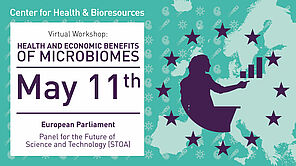Biodiversity, sustainable food, sustainable agriculture and circular economy - how can microbiome innovations contribute to solving major societal challenges? Answers to this question will be discussed at the virtual workshop "Health and Economic Benefits of Microbiomes" on May 11, from 2.00pm-4.30pm. At the prominent workshop, where AIT expert Angela Sessitsch will speak on “How tiny little things run the earth and the circular economies” , MEPs will meet with top researchers and policy advisors.
On May 11, 2021, 2:00pm-4:30pm, the virtual workshop "Health and Economic Benefits of Microbiomes" will take place, led by the STOA Panel (Panel for the Future of Science and Technology in the European Parliament) of the European Parliament. Top European researchers will present the latest in microbiome research in the areas of human and animal health, antibiotic resistance, environmental sustainability and the circular economy. Policy advisors from EFSA and OECD will inform on the safety and regulatory pathways of microbiome innovations and the different options for microbiome-related policies and collaborations.
The workshop will be led by Irene Verheijen, European Association for Food Law (EFLA). Eva Kaili, Chair of the STOA Panel, and Ewa Kopacz, Vice President of the European Parliament, invite an open discussion. Both scientific and regulatory work can influence circular economy strategies and action plans at the European and national levels in the future.
Many of the researchers and experts presenting at the event are part of the "MicrobiomeSupport" project coordinated by Angela Sessitsch and funded by the EU. This aims to map ongoing microbiome research worldwide, develop a coherent future microbiome research strategy, and disseminate research findings to policy makers and businesses. "Our growing understanding of the interconnectedness of microbiomes in environmental and food systems suggests that microbiome innovations have the potential to improve the sustainable production of food, feed and biofuels while supporting the principles of the circular economy," explains Angela Sessitsch, Head of Competence Unit Bioresources at the Center for Health & Bioresources.
What exactly are microbiomes?
Microbial communities, i.e. microbiomes, determine virtually every living system on Earth, impacting the quality of soils, water, air, plants, food, feed, animal and human health, and climate. Scientists are striving for discoveries in microbiology and microbial systems around the globe. Many exciting microbiome-related innovations can be expected with significant contributions to produce more healthy, environmentally friendly and sustainable foods, improve plant production through microbial biocontrol against plant diseases, manage animal health for the better or develop waste degradation systems reducing impacts on the climate by reusing and recycling materials and energy. As such, microbiomes need to be understood as small little things that run the Earth – and the circular economies, top-notch on the EU agenda.
Please register: https://www.europarl.europa.eu/stoa/en/events/upcoming
More information: www.microbiomesupport.eu



